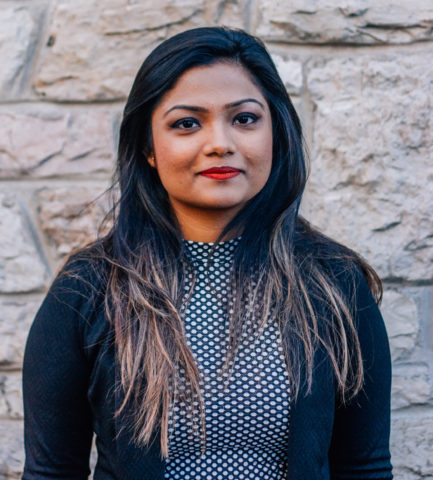As final exams draw strikingly near, anxiety at the University of Saskatchewan grows, and yet students can take heart in the fact that the holidays are just around the corner. While December may loom large in everyone’s minds, important holidays take place year round. The university is home to a vibrant and diverse group of students, each with their own important traditions.
Jebunnessa Chapola:
College of Arts and Science, third-year women’s, gender and sexualities PhD program
“I’m going to talk about Feb. 21, which has been declared as an international mother language day by UNESCO in 1999 … It’s a very important day for [Bengali people] because in 1952, Feb. 21, Bengali people fought to achieve the rights of their mother tongue … So our students from University of Dhaka … led that movement, that was the language movement they created … In 1971, on the basis of that movement in 1952, we had our liberation war and we fought again to be independent from the oppression of Pakistan … So this Feb. 21 is a very very important holiday in Bangladesh, but it’s not a happy celebration. It’s a mourning day. It’s a very sad day. We use black colour of badge on everybody’s shoulder, the way you use here the poppy in your Remembrance Day.
“From that language movement, I have learned how to fight for all the endangered languages and ethnic languages of this world … I have stolen that spirit from that movement that still I am carrying to fight for my rights today.”
College of Engineering, third-year mechanical engineering
“Every December, our family gets together. I’m from a Sikh family, so we have our own religion and our own holidays and stuff. But since we have moved to Canada and everything, we’ve acquired the Western culture as well. So we do celebrate Christmas, not to the extent of how other people do, but we do it our way. We always have family gatherings and then the biggest thing is, every New Year’s Eve, we get together at my grandparents’ house, and so that’s where all the cousins, aunties, uncles, nieces and nephews — they all get together and we celebrate New Years like that.”
College of Agriculture and Bioresources, third-year food and bioproduct sciences
“We have one festival from the east part of Malaysia and it’s called Gawai. It’s a harvesting festival to celebrate the day they harvest. They thank God for giving them the crops and all those things on that day. And how they celebrate it is, the [Dayak people], they live in a longhouse — it’s a house that can fit about 100 families. So they all gather together and they will sit around in the house in open space and then they have food. They also have rice wine called tuak … I think the organizers will go one by one and ask you to drink the rice wine. The funny thing is that you have to … finish it in one off. And sometimes, they’ll just keep asking you to drink so you just keep going on.”

Ewurabena Sackey-Forson:
College of Arts and Science, fourth-year physiology and pharmacology
“There are many religions in Africa, so not everyone celebrates in the same way. In Ghana, we really focus on New Years. So, for me, every New Year, we get together … everyone
brings their own dishes and we pray in the New Year … thanking God for what happened last year and asking for blessings and things like that for the upcoming year … The focus is on family, on food, on just getting together and … we don’t go home until super late … New Year’s Eve is the biggest thing. We don’t even say Merry Christmas. In my language — I’m Ghanaian — we say ‘afe hyia pa,’ the year has met us well, [answered by] ‘afe nko mbɔ tu hen,’ the year should go and come back to meet us.”
prospective nursing student, first-year
“For Filipinos, Christmas is something that you can’t really miss in my country because it’s too important that if you miss it, then you’re going to regret it for the rest of your year … Everyone in our neighbourhood or everyone in my family has gift-changing or if you have a godmother or a godfather, then you have to go to them and say thank you and then they will give gifts to you … Speaking about the food, the tables will be all filled and it’s not going to be empty the whole time. And especially at Dec. 24 … everyone is still awake until 12 in the morning. We call it Noche Buena … After eating with the family, the leftover food should be shared with the neighbours [and] we stay outside the house on the streets partying or lighting up fireworks.”
College of Medicine, first-year
“Eid ul-Azha is kind of the celebration of sacrifice. It’s one of the two holidays we have, the other being Eid ul-Fitr, which marks the end of Ramadan. But this one, [what] I particularly like is that, typically, if you’re able to afford it … you can go and you sacrifice an animal, like a sheep or something like that. And the meat that you get from that has to be shared amongst your family, amongst your neighbours and a third of it goes to the poor. And so that’s something I really like, particularly right now [when] we talk a lot about income inequality. In Islam, it’s if you have, you give.”
College of Arts and Science, fourth-year psychology
“One thing I think that is important to Ukrainians at Christmas time, whether that be Dec. 25 or Jan. 7, is carolling. It can happen within a family or group of people, even our student group does it, and it’s a way to spread the word of Christmas and it’s a way to welcome everybody in the community, make sure everybody feels like it’s Christmas. It’s a way to reconnect with people you haven’t seen. It’s a very social event where, of course, songs are sung and a lot of them do have religious imagery, but afterwards, everybody comes together in the home and they eat together and drink together, and it’s a big celebration together with everybody.”
College of Education, third-year Indian Teacher Education Program
“Within the last few years on my dad’s side, out on our acreage we have a nice fire, like a big bonfire actually, on Christmas Eve. And so we have a big bonfire and at midnight we open all of our presents … That wasn’t a regular thing growing up, but in the last few years [we’ve been] opening all the presents right at midnight on Christmas Eve and the bonfire as well. I have to say that is, just because it’s so new, it’s probably my most favourite right now, so we’re keeping it going. We have a meal right at midnight as well, just more so appetizers not a whole dinner or anything.”
Edwards School of Business, second-year marketing
“I think Chinese New Year’s Day is very important for Chinese people … What people do for Chinese New Year Day, just two classical things: eat and drink. All family will get together and go to restaurants or maybe eat at home … Children will hang out, play around, and during the night, adults won’t sleep. They don’t sleep because it’s kind of traditional, so they just want to pass this old year to a new year. So adults play Mahjong — it’s a Chinese traditional thing — during the night. And the kids must wake up the next day very early because parents think if kids wake up in the morning, early, they won’t be lazy in the whole year.”

Anika Mysha:
Edwards School of Business, fourth-year human resource management
“Muslim people … we celebrate two Eids a year, so that is kind of, I would say, our Christmas. So two Eids, one is Eid ul-Fitr which marks the celebration at the end of the fasting month of Ramadan … The second Eid is Eid ul-Azha, so that’s a festival of sacrifice. My favourite would be Eid-ul-Fitr … most people [fast] and then it’s a hard time, and here in Canada it’s harder because the day is so long. It’s like 16 hours or 18 hours. After that big month when we all come together, we make good food and then we go to our friends and family’s house. It’s a happy day. Everyone’s happy.”
—
Jessica Klaassen-Wright / News Editor
Photos: Jeremy Britz / Photo Editor
Featured Image: Lesia Karalash / Graphics Editor
Leave a Reply